If you’re wondering which VPN to buy, ProtonVPN or Mullvad VPN, you’ve come to the right place. ProtonVPN is a very enticing option. It’s a Swiss provider with a heap of security features and cutting-edge technologies, making it among the most advanced VPNs.
Mullvad VPN, on the other hand, focuses mainly on privacy and anonymity. These two VPNs are vastly different in many ways, which is why this comparison should be interesting. Now, you might be asking – how do we compare ProtonVPN and Mullvad VPN? Well, we have a grand total of 9 tests to go through.
We’ll compare them regarding security/privacy, ease of use, torrenting, streaming, performance, price, and a few other compartments. While Mullvad VPN is a great VPN, we’ll see if it can stand up to the, at first, a more robust and popular option like ProtonVPN. Without further ado, let’s begin the Mullvad vs ProtonVPN duel.
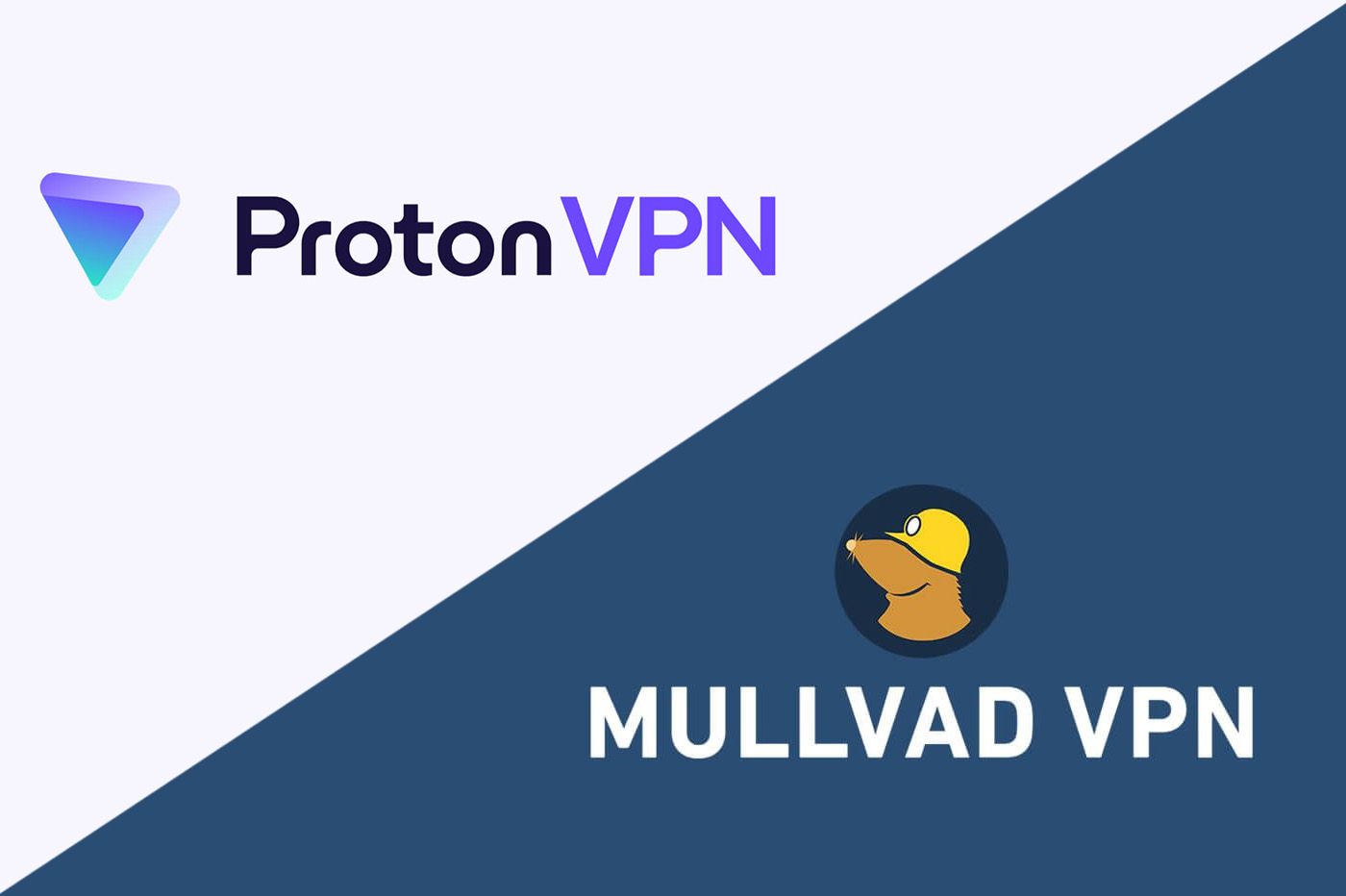
ProtonVPN vs Mullvad VPN: Apps & Ease of Use
The first test we’ll do for today has to do with ease of use and compatibility. Let’s be clear. Neither of the VPNs is the champion of compatibility, especially when pinned against ExpressVPN or CyberGhost. However, we’d be lying if we said that they don’t at least support basic platforms.
By this, we mean Windows, macOS, Android, iOS, and Linux. Yes, it’s great that Mullvad and ProtonVPN support several Linux distros, which Ubuntu and Linux Mint users will oblige. Mullvad VPN is a bit limited here, as these are all the apps you get if we don’t count its fantastic Tor-like browser.
Oh, and Mullvad also includes a Firefox extension, but interestingly, a free Chrome VPN extension isn’t there. On the flip side, ProtonVPN’s inclusion of both Firefox and Chrome extensions is much more welcome, as it can even work on a browser like Brave, which is based on Chromium.
Plus, ProtonVPN works on Smart TVs, Firestick TV devices, Chromebooks, and even routers. You’d be surprised to find out that it supports more than 15 types of routers, including DD-WRT, pfSense, Tomato, Vilfo, AsusWRT, and many others.
In terms of simultaneous connections, the numbers aren’t sky-high. Mullvad VPN limits you to only 5, which is critically low at this point in time. ProtonVPN goes for 10 connections, which, we think, is much better even when compared to NordVPN (6), CyberGhost (7), and ExpressVPN (8).
ProtonVPN
The ease of use of Mullvad and ProtonVPN is excellent. But to be frank, ProtonVPN took it to the next level with a modern-looking app that never fails to amaze us. In the style of NordVPN, it gives you a world map with a server list on the left for easier access.
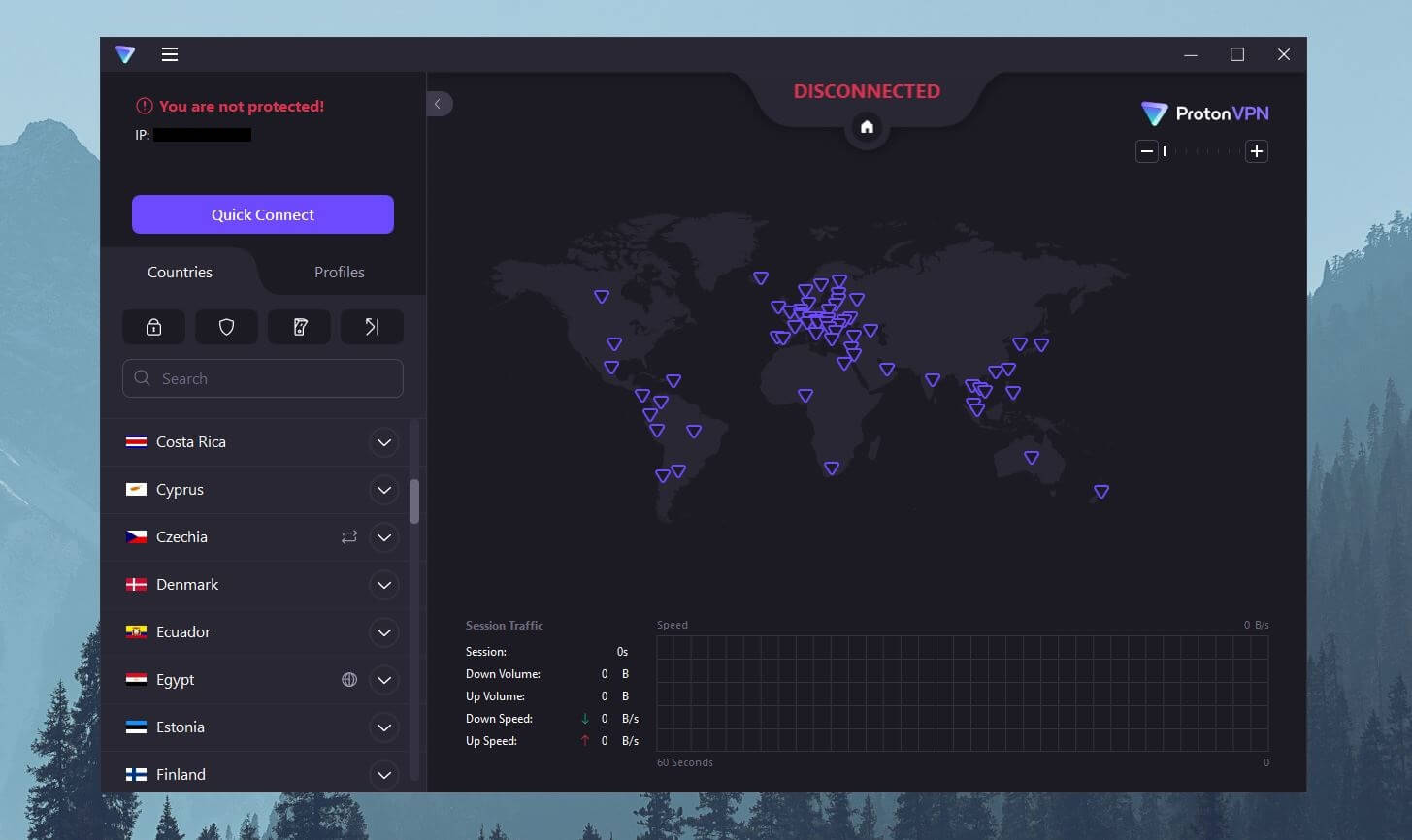
On the home screen, you can also enable a kill switch, use an ad blocker, turn on/off port forwarding, and take advantage of Secure Core servers. Each server location offers a few cities to pick from and you can connect by double-clicking on the location you want.
Since ProtonVPN uses WireGuard, connections are quick and snappy. To open Settings, click on the three horizontal lines in the upper-left part of the screen. Here, a new mini-window opens and you can find all VPN-related options in just two windows – remarkable.
It’s easy to change the protocol, enable VPN Accelerator, or change the basic behavior of the app. ProtonVPN’s desktop and mobile apps are simply extraordinary. Both iOS and Android apps are very handy for day-to-day use, packing nearly identical options to their desktop counterparts.
We were also impressed to find a full-fledged GUI on Linux! The application doesn’t require you to use complex lines of code to connect to a server. Instead, you can use a beautifully crafted app, connect in a second, and enjoy your safe and secure internet voyage.
Mullvad VPN
In this Mullvad VPN vs ProtonVPN analysis, we liked Mullvad’s app a bit less. However, it doesn’t mean it’s bad or non-functional. As you can see below, the Mullvad app is very different from the ProtonVPN app. For the start, it comes in the form of a small window with a connection button and the server list.
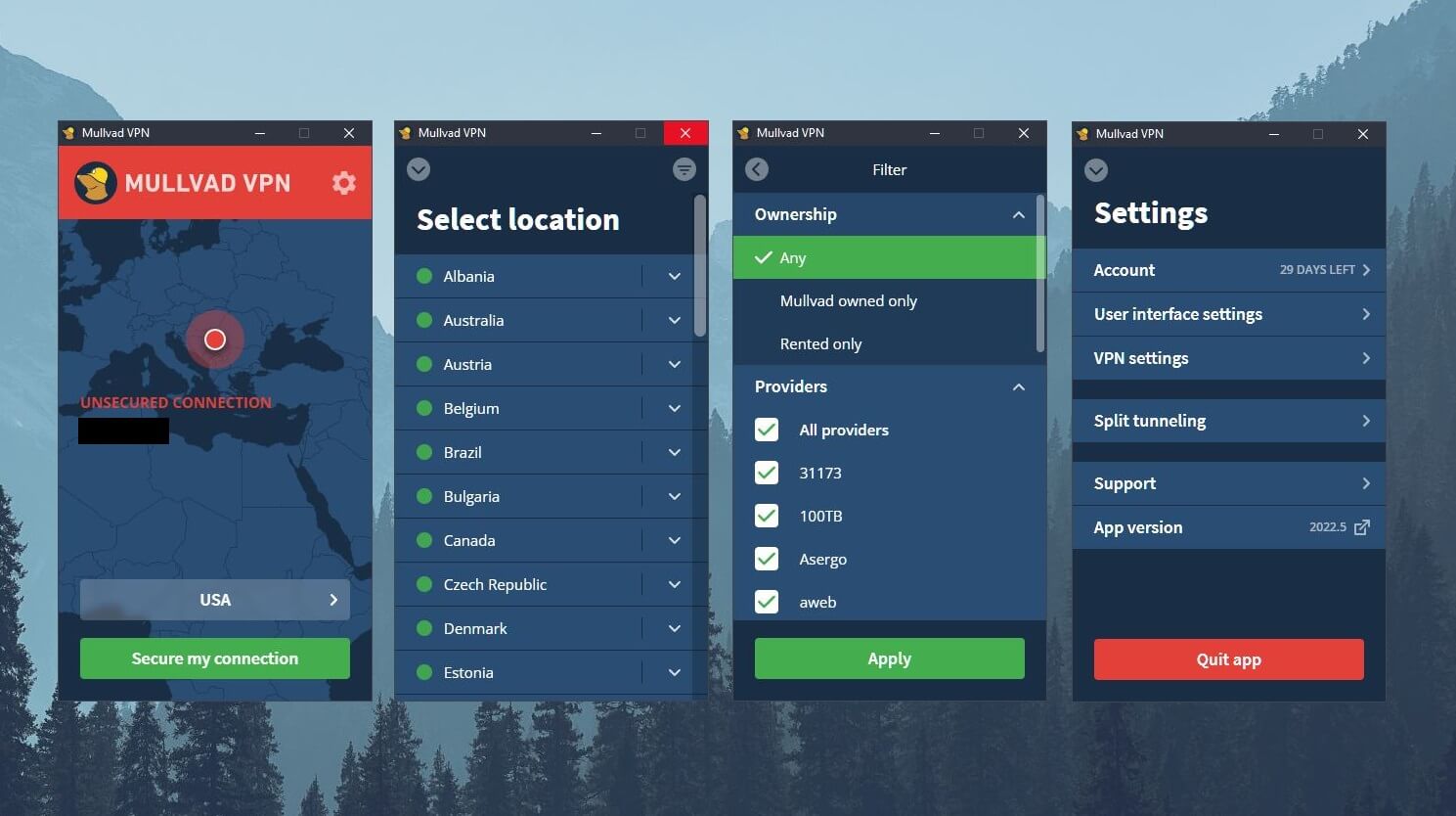
You can open the server list by clicking on the arrow next to the country. From here, users can connect to a server by clicking once on the location and then using the connection button. Again, connection times are short if you’re using WireGuard, which Mullvad, thankfully, offers.
The Settings menu is easy to access by clicking on the Gear icon. Here, all relevant features have separate menus and sub-menus, which makes things easier. You can also change the user interface and tweak it to your liking, something we’ve seen in Surfshark.
One thing we really like is the option to filter the servers. Mullvad VPN lets you use only Mullvad-owned servers or search for particular providers. When it comes to mobile apps, Mullvad VPN used to not offer one for iOS. In 2025, that’s completely remedied and we have both iOS and Android clients.
Our team likes that the app on iOS/Android is nearly 100% identical to the app on Windows and macOS. Thus, you’ll quickly get in gripes with it. Disappointingly, the Linux GUI isn’t here, so you’ll have to rely on the terminal for all commands – such a slog.
Who Wins?
If ease of use is one of your main criteria, which VPN wins, ProtonVPN or Mullvad VPN? Well, in this case, ProtonVPN WINS, as it offers a more modern, yet simpler app to use than Mullvad. Not to mention 10 simultaneous connections and overwhelmingly better compatibility, which makes it a clear winner.
Security & Privacy: Which One Is Safer to Use?
Both ProtonVPN and Mullvad VPN will excel in security and privacy, no doubt. But if you’re looking for that edge and want to enjoy the highest possible levels of safety, which VPN should you get? Well, let’s answer your burning question now.
Security Features
Starting this security analysis, we first need to discuss the features that Mullvad and ProtonVPN share. If you know how a VPN works, you know the principle is pretty much the same. There’s encryption, which, in this case, is AES-256 encryption on both sides, so we have an identical setup.
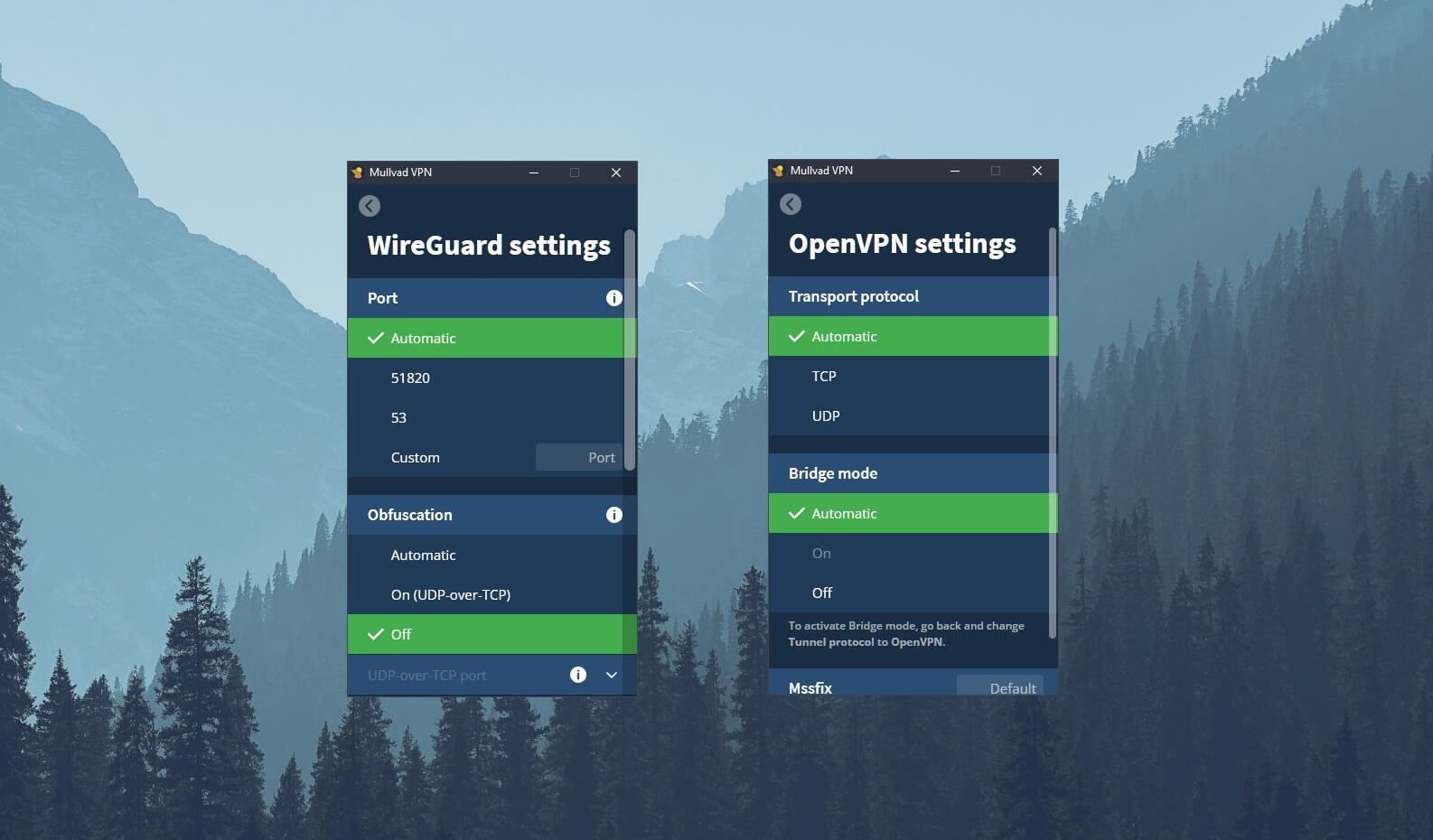
A kill switch is necessary to avoid IP leaks, and thankfully, both providers have it. Since both are very secure, you can also expect full IP/DNS leak protection, with support for OpenVPN and WireGuard protocols. In this case, they’re 100% identical.
Mullvad and ProtonVPN offer split tunneling as well, which can be handy for routing only specific apps through the VPN tunnel. One thing to mention is that ProtonVPN offers SecureCore servers, which route your traffic through 3 servers for extreme privacy.
Mullvad offers something called a Bridge, which routes the traffic through 2 servers, using Shadowsocks proxy. In addition, there’s MultiHop, which behaves similarly but with no Shadowsocks in place. Like ProtonVPN, it offers port forwarding, a feature useful for torrenting.
When it comes to RAM-only VPN servers, it’s good to know that both VPNs use them. Finally, Private DNS is used by both companies to prevent any third-party DNS server interference. This automatically protects your DNS queries from being leaked to your ISP’s watchful eye.
What Are the Differences?
As you can guess, ProtonVPN and Mullvad VPN have some differences too. ProtonVPN includes a feature called NetShield, which is an impeccable ad blocker. This feature blocks even trackers and malicious sites, so it’s useful for ensuring a higher degree of online security.
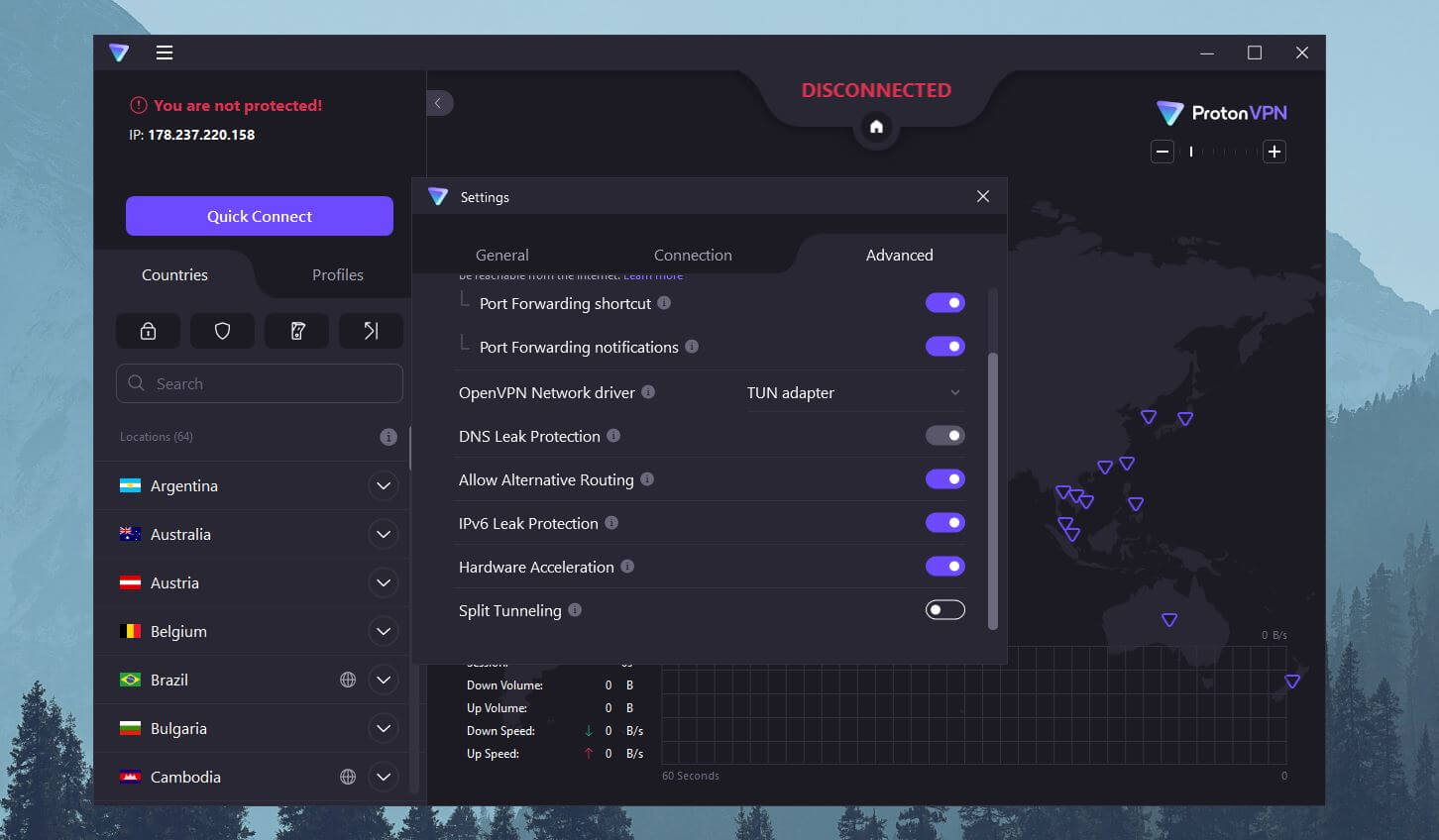
In addition, ProtonVPN has Forward Secrecy. It generates unique encryption keys in each session, using PFS to safeguard your connection each time. It basically adds another layer of security to the VPN encryption, making sure it protects you far beyond its already vast limits.
On macOS, ProtonVPN offers the Stealth VPN protocol too, along with Alternative Routing, helping you get over censorship. Mullvad VPN’s features aren’t very numerous. However, some interesting options are here, such as the aforementioned Bridge mode and a few advanced features.
For example, you can set a custom WireGuard MTU size to mitigate performance issues. Even better, you can regenerate your WireGuard keys, which ProtonVPN doesn’t allow. In this ProtonVPN vs Mullvad VPN comparison, we like that the latter offers a SOCKS5 proxy as well.
Last but not least, Mullvad lets you create an account 100% privately and anonymously with no email address or any other compromising info. You’ll just generate an account number, buy a subscription, and log in with the account number instead of your email.
Is There a No-Logs Policy?
As you can expect, whether you choose Mullvad VPN or ProtonVPN, you’ll have no problems with logging. ProtonVPN is based in Switzerland, while Mullvad VPN resides in Sweden. The latter isn’t the best jurisdiction due to its involvement in the 14 Eyes alliance.
However, that doesn’t seem to phase Mullvad VPN, which boasts a crystal-clear no-logging policy and two security audits. In fact, Mullvad’s anonymity-based model ensures your private information won’t be stored and its privacy policy just confirms that.
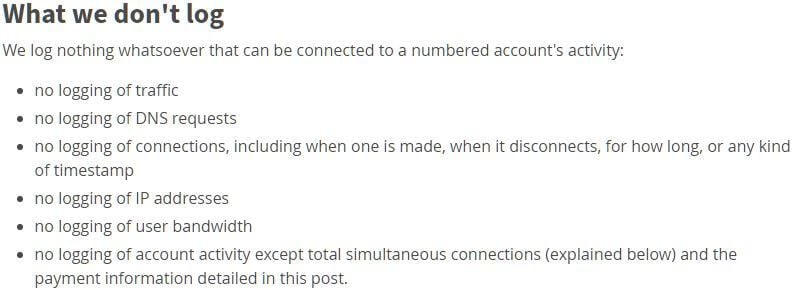
The privacy policy is more than concise. In it, we can see that Mullvad doesn’t keep logs of DNS requests, IP addresses, used bandwidth, traffic logs, timestamps, and so on. Your email isn’t even stored and the provider lets you buy a subscription with real money or vouchers.
ProtonVPN’s subscription process isn’t as anonymous but that doesn’t matter because this is a no-logging service in its purest form. Like Mullvad VPN, ProtonVPN keeps absolutely no information that could compromise your privacy, except for your email and payment data.
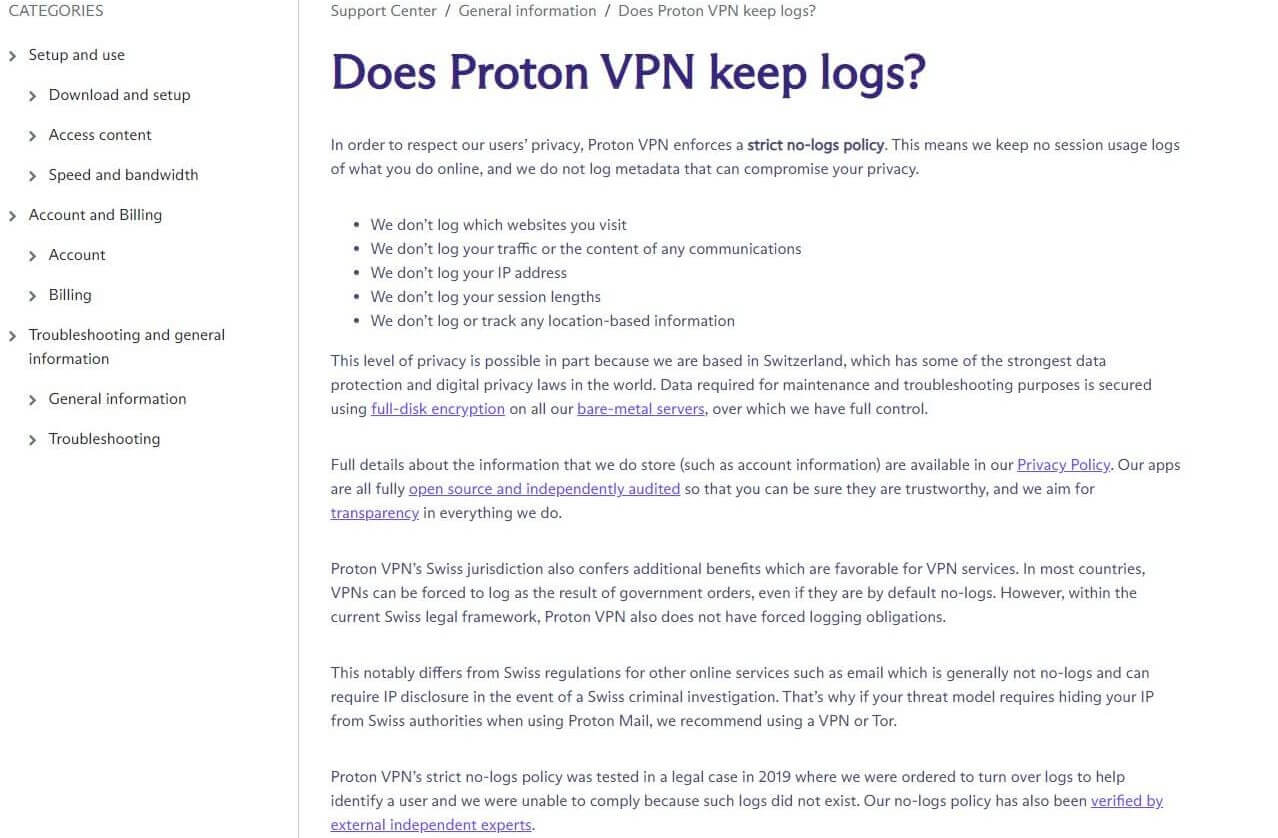
As you can see, even geolocation information isn’t being stored, let alone websites you visit, session lengths, and other tidbits. Since both VPNs offer RAM-only servers, we can be even more sure that no excess logging is going on in the background.
We must admit that we like the Swiss jurisdiction more compared to Sweden. But even as a VPN from Sweden, Mullvad is surprisingly secure. Oh, and one more thing – ProtonVPN also has a few security audits under its belt, as we’ve come to expect from a provider of this caliber.
Who Wins?
In this part of our ProtonVPN vs Mullvad VPN, it’s difficult to declare a winner. We call this round a DRAW and we’ll explain why. While ProtonVPN has a few bonus features that Mullvad doesn’t have, for the most part, the roster of features is almost identical.
Still, we must take into account Mullvad’s anonymity and privacy, which almost no other VPN on the market offers. ProtonVPN’s Swiss jurisdiction is definitely better but having in mind that both have security audits, we can see exceptional perks and advantages on both sides.
ProtonVPN vs Mullvad VPN Streaming Test
Mullvad VPN isn’t advertised as a streaming VPN and that’s pretty self-explanatory. If you’re getting this provider to watch sports streams and enjoy blockbusters on HBO or Netflix, don’t do it. In our review of Mullvad VPN, we were thoroughly disappointed with its streaming capabilities.
During our numerous tests, Mullvad couldn’t unblock a single Netflix library – not even the US one. This applies even to popular services like Disney+ and BBC iPlayer. Mullvad VPN will unblock a few TV channels, though, but the streaming experience isn’t the best.
This is quite a strange phenomenon, as the provider offers WireGuard, which promotes fast speeds. Nevertheless, ProtonVPN comes in as a perfect alternative to Mullvad. This provider’s streaming capabilities are better than expected and it can unblock 10 Netflix catalogs – more or less.
Our ProtonVPN test implies that it works with Netflix US, Japan, Canada, and a few other libraries. On top of that, its servers are capable of accessing Hotstar, Disney+, HBO, and even BBC iPlayer. Another perk is the ability to access hundreds of foreign TV channels, especially those from the US.
The streaming experience is excellent as well. The provider rarely gets blocked by streaming services due to advanced obfuscation and WireGuard support. Not to mention that buffering and slowdown aren’t present for the most part because we’re talking about a fairly fast VPN.
Of course, ProtonVPN isn’t the best option, and for less money, you can get Surfshark which works with 20+ Netflix catalogs. Or perhaps, pay slightly more and revel in ExpressVPN‘s fastest speeds and servers in 105 countries around our beautiful planet.
Who Wins?
ProtonVPN WINS this round by being a better choice than Mullvad VPN for streaming. Mullvad doesn’t even come close since it cannot unblock a single streaming service of Netflix library. Such a shame for a provider that thrives in terms of privacy and security. Streaming would be a HUGE improvement to the formula.
Mullvad VPN vs ProtonVPN Speed Comparison
Having at least a sublime performance with a VPN is imperative for almost any activity. For gaming, you need low latency, while streaming, downloading, and uploading require a fast internet connection. ProtonVPN or Mullvad ? Which VPN is faster?
To answer this question, we did a series of in-depth speed tests. First of all, we need to talk about our location. At the time of performing these tests, we were in Europe. We did a speed test without using a VPN, so our native speeds look like this:
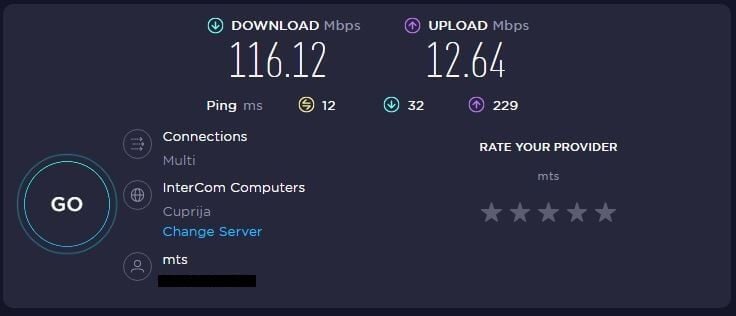
Having these results set in stone, we proceeded with our testing of Mullvad VPN and ProtonVPN. Both VPNs are tested identically. Each of them was tested 3 times a day, for 3 days in a row, across 4 popular server locations. These include the UK, the US, Australia, and Japan.
The protocol we use is strictly WireGuard, as it offers the best speeds. OpenVPN is slower and definitely less viable in 2025, so our guess is that you won’t be using it too much. The results you see below are the best we got from Mullvad and ProtonVPN, so let’s go through them together.
Mullvad VPN
UK:
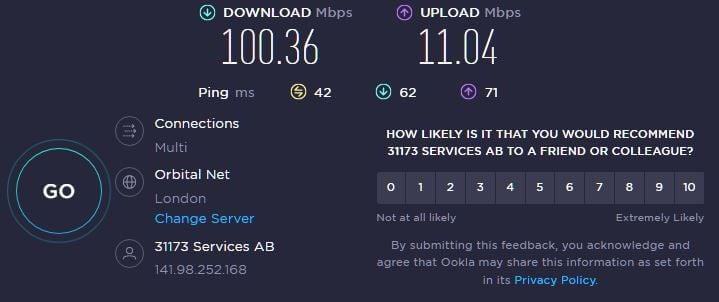
US:
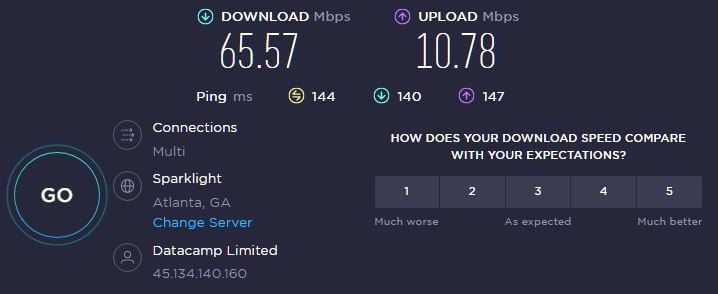
Australia:
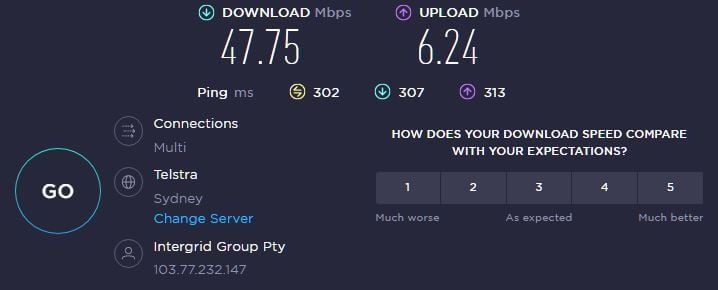
Japan:
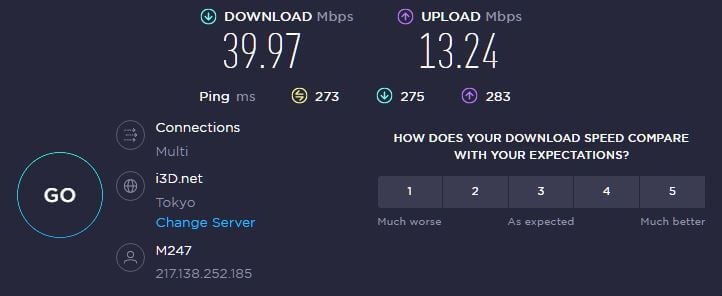
ProtonVPN
UK:
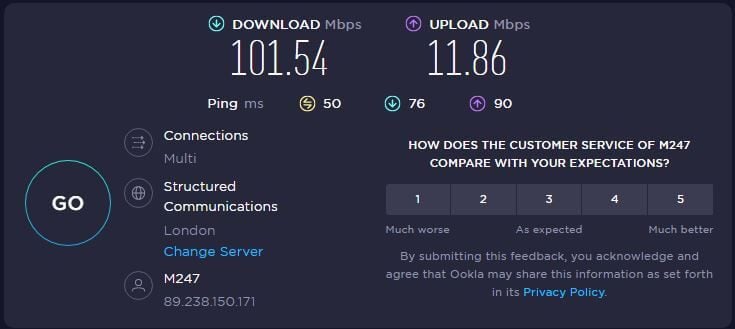
US:
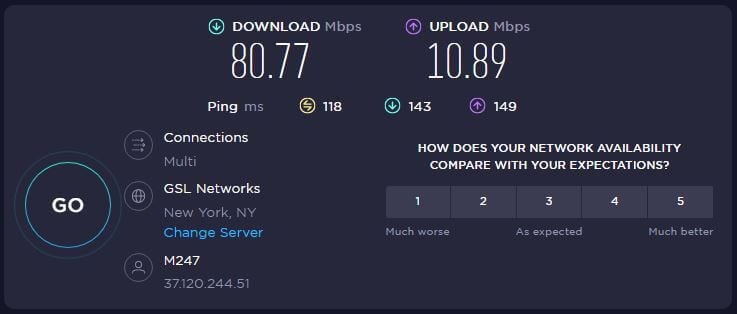
Australia:
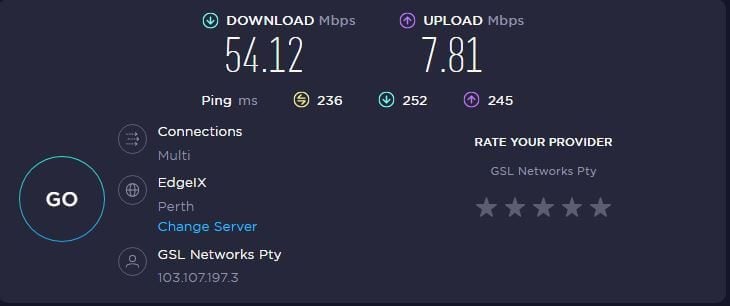
Japan:
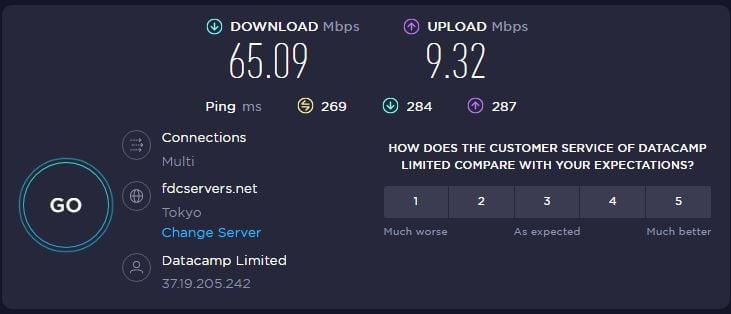
Who Wins?
From the screenshots below, we can conclude that ProtonVPN WINS this round against Mullvad VPN. Our download/upload speeds on the UK server were almost identical, with Mullvad having a slightly lower latency value (42 ms vs 50 ms in ProtonVPN).
However, all other tests on American, Australian and Japanese servers showed results in favor of ProtonVPN over Mullvad. It’s not only significantly faster but also provides lower latency, which puts it at a clear advantage. No doubt, you’ll enjoy its performance way more.
Torrenting: ProtonVPN or MullvadVPN?
Torrenting is something that ProtonVPN and Mullvad VPN allow. This comes as no surprise because these two are premium options. Whether you’re using ProtonVPN or Mullvad VPN, we can guarantee more than decent performance for torrenting.
While ProtonVPN has port forwarding, Mullvad includes SOCKS5 as a way to improve torrenting. Neither of the options will drastically improve the performance but if such issues are present, SOCKS5 and port forwarding can sometimes make a difference.
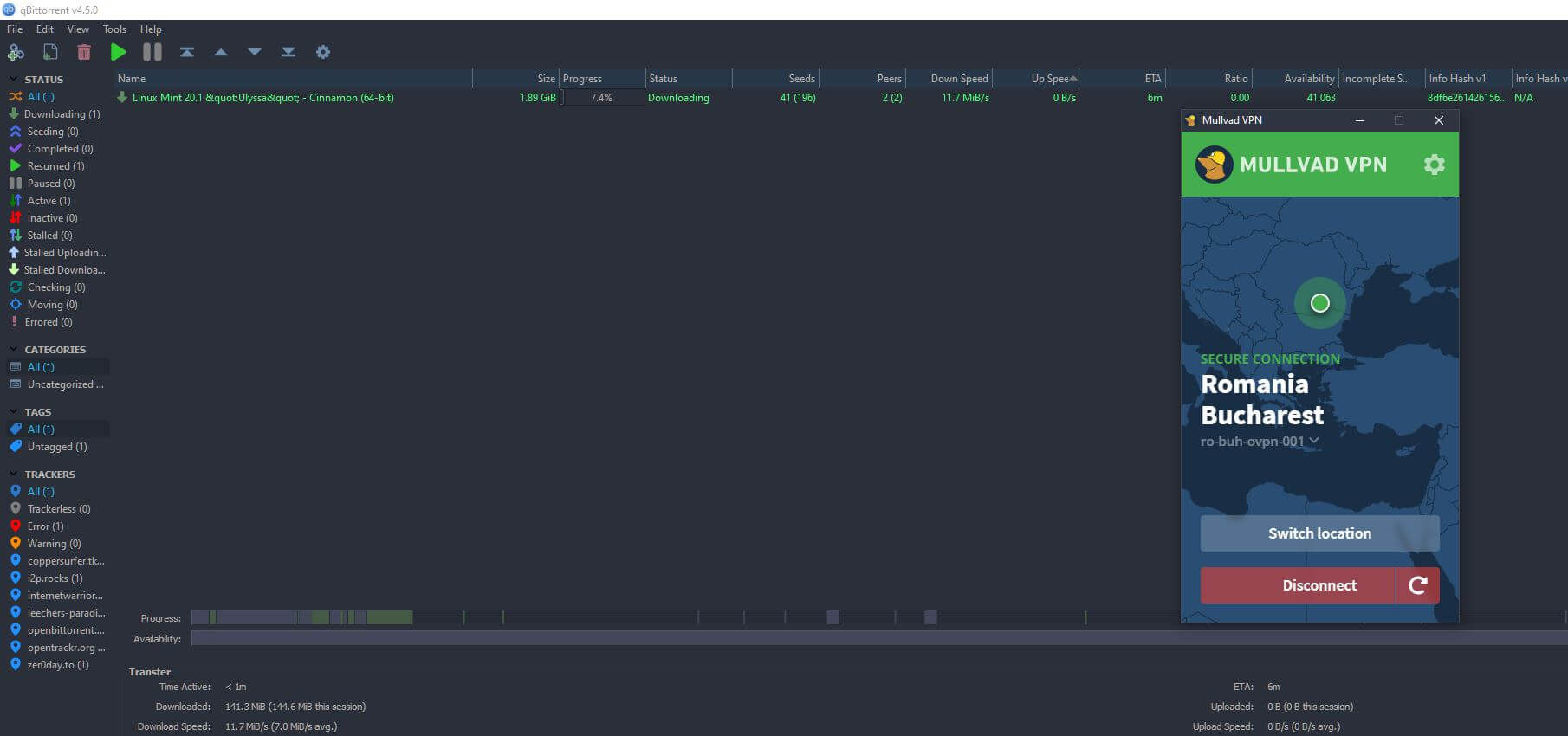
Above, we can see that Mullvad works perfectly for torrenting. Its speeds are stellar and our Linux Mint download was blazing-quick. The provider supports P2P out of the box and with no special servers. This means connecting to any server and starting your download is all you need.
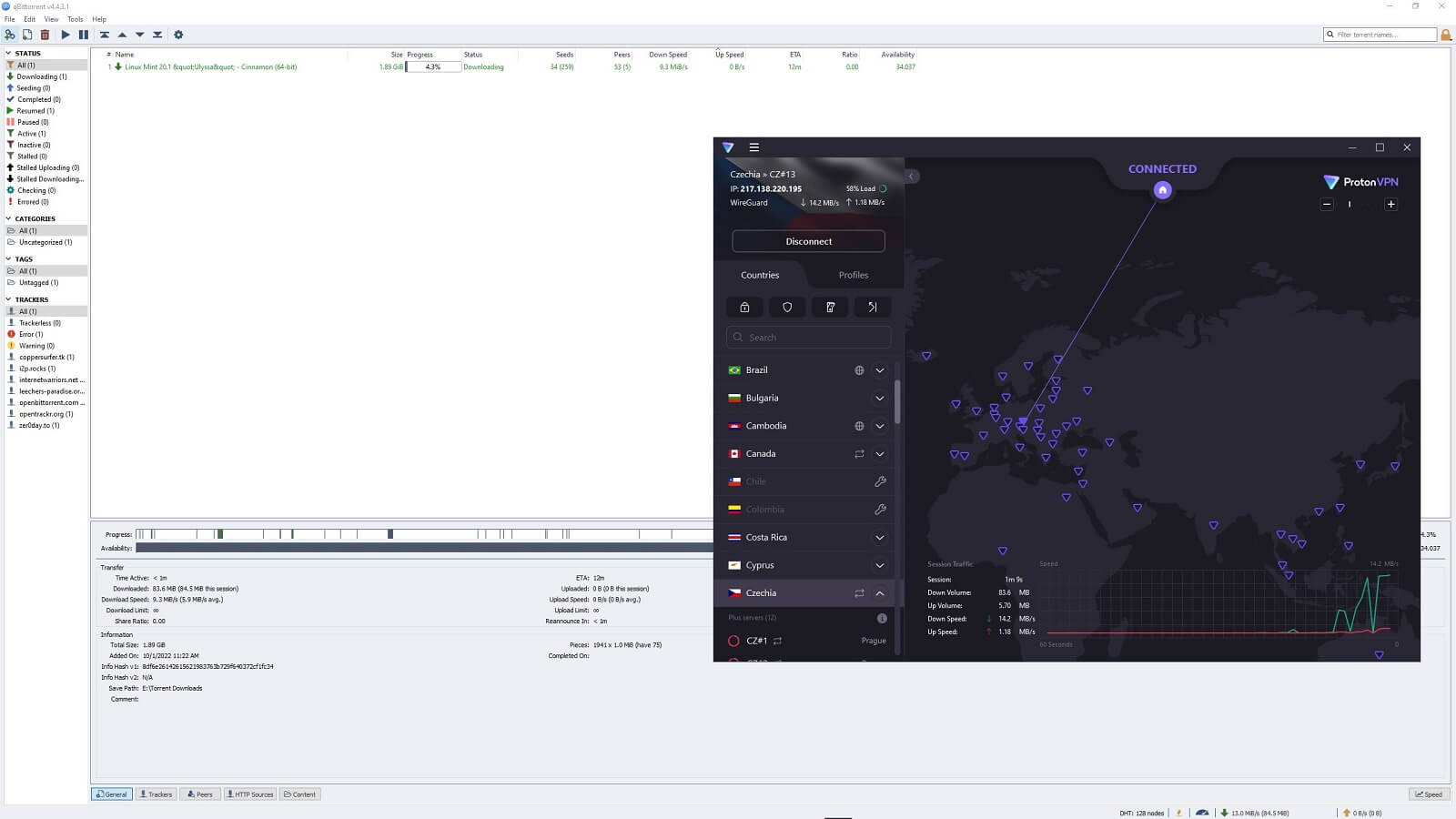
What about ProtonVPN? Well, the situation is exactly the same. Although it has some P2P-optimized locations, the provider supports this activity regardless of the server you’re on. We do recommend using P2P servers, though, as they can prove more reliable in some situations.
But rest assured, even long-distance servers work quite well. For example, we intentionally tested the US server at one point while being in Eastern Europe. Much to our surprise, the speed reduction was almost non-existent and the VPN downloaded our torrent files quickly.
Who Wins?
Once again, we’re facing a DRAW. Mullvad and ProtonVPN are not only fast and reliable for torrenting but also extremely secure. Remember their no-logging practices? Well, they’ll be crucial for downloading torrents and concealing your download history from the prying eyes of your ISP.
Are Mullvad VPN and ProtonVPN Working in China?
The ability to bypass censorship in China is one of the most important factors in a VPN service. At least for those who frequently go there or worse, live in this country. We’re disappointed to say that neither ProtonVPN nor Mullvad VPN are working properly.
ProtonVPN is officially blocked in the country, which can even be seen on the provider’s website.
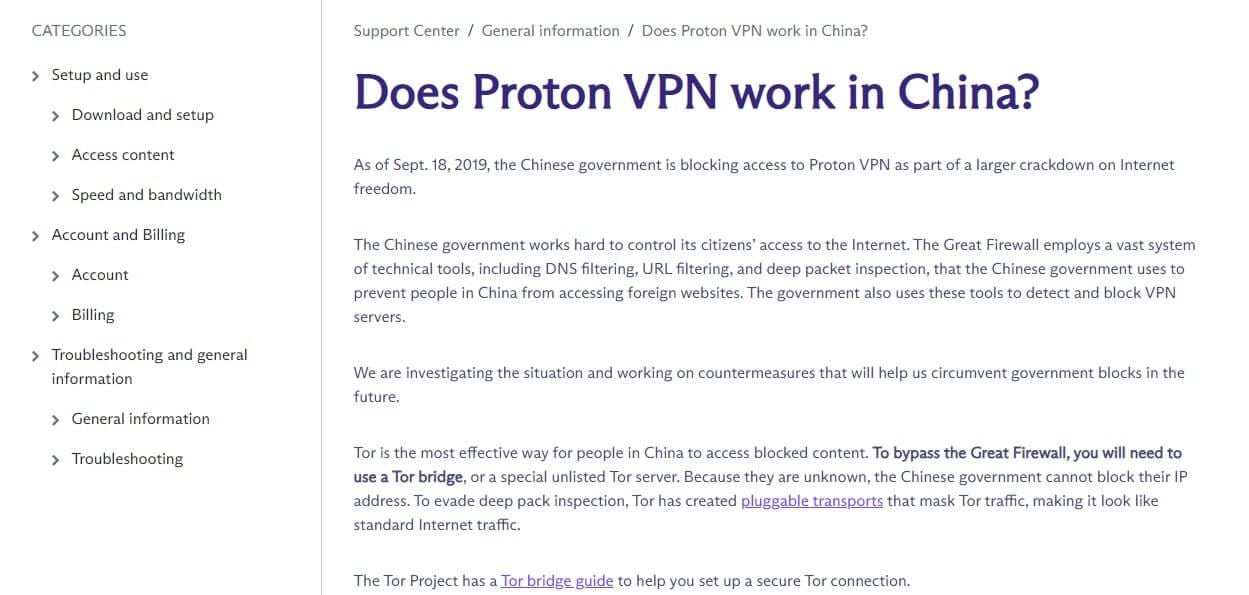
ProtonVPN offers Stealth VPN on macOS but during our tests, it wouldn’t work no matter what we tried. Mullvad VPN offers this Shadowsocks proxy which is used in the Bridge mode. Basically, you can connect to a server using this proxy, which helps get over censorship.
However, in China, this isn’t working well, as our team members couldn’t connect to a server properly. 10 out of 10 times, neither of the VPNs were working, which is a colossal disappointment. Needless to say, we don’t recommend any of them for China.
Here is the list of the top VPN for China if you’re interested. But the short version is that you’ll be best off with ExpressVPN, NordVPN, and Surfshark. Astrill VPN is another very reliable option, alas, with a sky-high price that you most likely wouldn’t want to pay.
Who Wins?
The round ends up in a DRAW but not in a good way. Both providers show poor results in China, being unable to get over the Great Firewall. On the flip side, mildly censored countries won’t pose a problem to ProtonVPN and Mullvad VPN.
As such, users can freely enjoy them in the UAE, Qatar, Turkey, and Russia.
ProtonVPN vs Mullvad VPN Server Fleets
When talking about premium services, you most likely expect gargantuan server fleets that span hundreds of countries. Well, only a few of them achieve this, such as ExpressVPN and PIA. Whatever the case, we’ll examine both providers and see how impressive their server parks are.
ProtonVPN (3,000+ servers in 68+ countries)
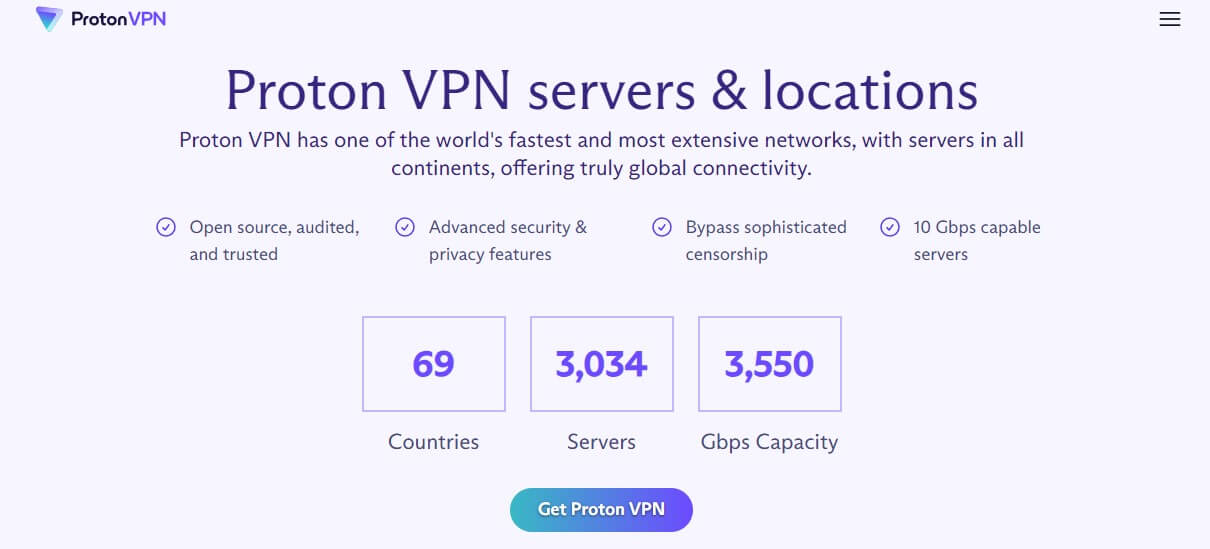
ProtonVPN has come a long way from just shy of over 1,000 countries in 40-50 countries. Nowadays, the service has 3,000+ servers in nearly 70 countries and the server list is growing exponentially. ProtonVPN’s server distribution is top-notch, to begin with.
We’re looking at servers in the US, the UK, Europe, Canada, Japan, Australia, and plenty of other popular countries. Moreover, users get 100+ Secure Core servers, as well as many in India, Africa, Asia, and even South America.
ProtonVPN offers some virtual servers too, especially in censored countries like Turkey, again – India, and a few others. Vital to point out is the presence of specialty servers. These include P2P, Tor Over VPN, and streaming servers made for… well, streaming!
The server fleet has a capacity of 3,500+ Gbps, too. Plus, all servers are hosted on RAM, which improves privacy dramatically. While not the most impressive ever, this server park is more than respectable, both in terms of quality and quantity, so a small server network isn’t a downside anymore.
Now, we have a robust server infrastructure that serves as a perfect quality-of-life improvement.
Mullvad VPN (641 servers in 40 countries)
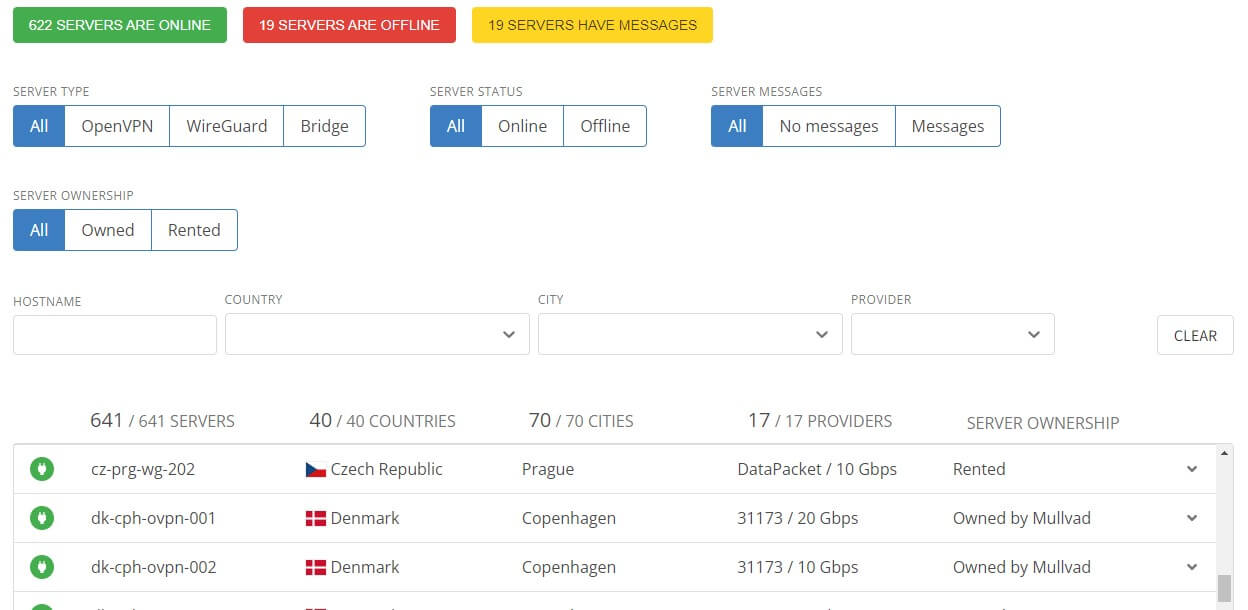
Mullvad VPN is that kid from your class who’s stuck in his teenage years forever. Instead of improving, Mullvad VPN’s server network hasn’t moved an inch in years. However, the provider offers 640+ carefully crafted servers in 40 countries.
These numbers are way smaller than ProtonVPN but we say “carefully crafted” because the server quality is impeccable. Of course, these are 10 Gbps, RAM-only servers with the highest level of transparency. Namely, the provider lets you see the server ownership for each server.
Some servers are rented – well, most of them actually, while some are owned – around 180. The server distribution is decent for the number of countries. Aside from popular locations, Mullvad offers a heap of servers in Europe but very few in Asia and Africa.
For example, VPN servers in Hong Kong are here but you won’t find Indonesia or the UAE. In fact, the majority of the server fleet is in the US, where the service has 220+ servers. All in all, nothing impressive and we’d like to see many more countries down the line to make the provider worth the asking price.
Who Wins?
After a thorough examination in this round, ProtonVPN WINS. It’s simply a more capable provider, offering a vast server network with thousands of servers. Mullvad VPN’s server fleet is akin to a free service, which doesn’t exactly make us want to pay for it.
Customer Support: ProtonVPN or Mullvad VPN?
Customer support isn’t particularly impressive in either option. Mullvad VPN relies on email support, with no live chat service. The good thing is that responses through email are quick and surprisingly, you usually don’t have to wait for more than 30-60 minutes.
The support section of the site is kinda… basic. You’ll get many FAQs to read through, and if something is unclear, you can refer to the customer support service through email. That’s all. Now, ProtonVPN offers something more interesting.
At first, it seemed like it was offering only email support. When you first visit the site, you’ll see that the only option to contact the company is by completing the support form. The provider will get back to you ASAP but this “ASAP” can be anywhere from 30 minutes to a day.
The second option is to send an encrypted mail to [email protected] but this, for some reason, extends the time it takes for the support team to answer. Finally, we found the live chat option, which lets you talk with the agent in real-time. The catch?
Well, it’s viable only for those with a paid VPN subscription. If you’re using a free VPN or you haven’t become a user in the first place, you’ll have to go with either standard email or secure email – nothing more than that. Of course, self-help methods are here but they’re nothing special.
ProtonVPN has various FAQs, how-to guides, and everything else to help you get started.
Who Wins?
ProtonVPN WINS this round because it offers a more diverse selection of ways to contact support. While Mullvad relies on email support, ProtonVPN offers even the 24/7 live chat option, alas, locked behind the paywall. But since it’s there and Mullvad doesn’t offer it, it’s enough for the Swiss VPN to win.
Mullvad VPN vs ProtonVPN Pricing Comparison
For the last Mullvad VPN vs ProtonVPN comparison, we’ll have to talk about their prices. This one will be interesting because we’re looking at the two very different pricing structures.
Mullvad VPN
As said earlier, Mullvad VPN functions vastly differently than any other VPN from the get-go. First, you’ll generate the account number and then add time to the account. This “adding time” is a euphemism for “buy the freaking VPN!”

You’ll notice three subscription plans that are all but. There are no plans here – only one plan at 5 Euros or around $5.28 a month. This applies to any length, whether it’s 1 month or 1 decade. You can pay monthly or, for example, spend 60 Euros and get 1 year’s worth of VPN.
Also, you can cancel the subscription at any moment if you don’t need a VPN anymore. However, keep in mind that there’s a 30-day refund policy, which you can use once. If you cancel the VPN after this period, Mullvad VPN will accept your request but won’t issue a refund.
We want to mention that Mullvad has a heap of payment methods. Aside from cash/vouchers, you can pay using crypto, credit/debit cards, PayPal, Giropay, Eps transfer, iDEAL, and many more. Mullvad VPN is, as a result, flexible and ready to come to your aid according to your terms.
ProtonVPN
ProtonVPN isn’t known as the most affordable service. In fact, we often complain about its expensive prices which is why we often give advantage to NordVPN, CyberGhost, and Surfshark. However, let’s take a look at its bog-standard pricing structure:

Compared to Mullvad VPN, ProtonVPN costs the same per month if you’re going for the 2-year plan – and perhaps even cheaper. However, many users won’t be comfortable paying upfront and committing to 1 or 2 years, which makes Mullvad VPN more convenient.
At the same time, ProtonVPN offers a 30-day money-back guarantee, so obtaining a refund is possible. We haven’t mentioned its Proton Unlimited plans, though, so here’s a quick glance:

Essentially, you’re getting the VPN with the cloud storage service (Proton Drive), password manager (Proton Pass), and email service (Proton Mail). In this case, the price is much higher and the cheapest 2-year plan at $4.99 is now $7.99 a month or nearly $192 every 2 years.
Who Wins?
After the final test, it’s very hard to tell who is the winner. On one hand, we have ProtonVPN’s 2-year plan at $4.99 a month, which is cheaper than Mullvad VPN’s flat fee of ~$5.28 a month. Still, Mullvad lets you pay per month, while the first “forces” you to commit for 1 or 2 years in advance.
Therefore, the winner of this round will basically depend on your preferences. Do you want a better VPN and commit to a certain period or you’d rather pay as you go without any commitment? You answer this question to yourself. For us, the round is a DRAW – there is no winner.
Conclusion: ProtonVPN Wins!
You’ll agree that this ProtonVPN vs Mullvad VPN battle was pretty intense. But in the end, we must declare the winner. Did you already do the math? We have, so there you go – ProtonVPN WINS the duel with a score of 9:4 – congrats to the Swiss provider.
Does this instantly mean our wholehearted recommendation? Well, yes and no. ProtonVPN is better overall than Mullvad VPN, slowly approaching the very best VPNs on the market. It’s perfect for streaming, supports torrenting, offers a plethora of bleeding-edge security functions, and comes with a no-logs policy.
Not to mention its 10 simultaneous connections, compatibility with all devices, and live chat support for paid users. Mullvad VPN is all about anonymity and privacy, limiting its streaming, gaming, and unblocking capabilities.
It’s also not compatible with many platforms like Firestick and routers, plus, it has just 5 simultaneous connections. Last but not least, Mullvad’s support isn’t the most dependable and like its rival, it’s impossible to use in China. So, which one to buy – ProtonVPN or Mullvad VPN?
We’d say ProtonVPN for certain. In the long run (2 years), it will be around $20 cheaper but you’ll have to commit. If you’d rather save money and go for a cheaper provider, NordVPN is better than Mullvad and its 2-year plan is cheaper (and better!) than even ProtonVPN.